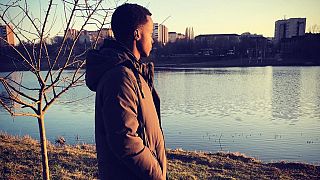'We are human too': Congolese student who fled Ukraine recounts racism

This time last month, Axel was an ordinary 20-year-old, studying computer science at a university in Kyiv, Ukraine.
Today in Brussels, Belgium, he is a refugee, and effectively stateless. He is also scarred from a harrowing journey from war torn Ukraine.
He told Euronews how he and his friends had to wait for hours to catch a train out of Kyiv because of the colour of their skin. When they reached the border, they faced abuse and exploitation.
"We were told to wait. He spoke aggressively, brutally with crazy gestures," Axel said.
Videos shared on social showed black people being pushed off trains and animals being prioritised before people.
European countries, particularly those neighbouring Ukraine, have been praised for welcoming refugees but African nationals have detailed racism they've encountered as they too fled Ukraine.
"We are human beings too, our lives count," Axel said.
More than 3.1 million people have now left Ukraine since Russia launched its military assault on 24 February, according to the UN Human Rights Office. It described it as the fastest-growing refugee crisis in Europe since World War II.
Change is a local Afro-Belgian association supporting Axel and 47 other students in limbo. They organised their transport from the Polish border and are helping gather clothes, shelter, set up language courses and also counselling to address the racism encountered.
"When these young people show their situation, I am very sad and I say to myself OK, it also motivates me to continue this fight that we are trying to do," Dido Lakama, co-founder of Change, told Euronews.
It is a fight that continues here in Belgium.
The European Commission has activated the Temporary Protection Directive which grants people who were permanently residing in Ukraine before the eruption of the war the rights to a residence permit, access to the labour market and housing, medical assistance, and access to education for children in EU member states for at least one year.
This applies to stateless persons and nationals of other third countries who benefited from international protection in Ukraine as well as those who cannot return in safe and durable conditions to their country of origin.
Dido wants Brussels to register, welcome and give access to Belgian universities to the Congolese students who fled Ukraine – just like Ukrainian refugees.
"We want to be able to finish our studies like the Ukrainians," Ruth, a Congolese medical student who had to flee Ukraine told Euronews.
The decision now lies with the Belgian government.

No comments:
Post a Comment